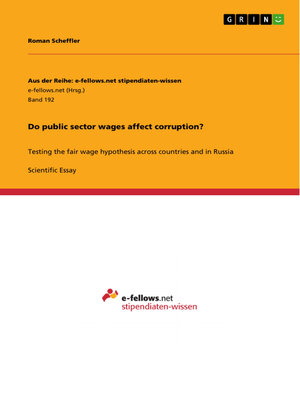Do public sector wages affect corruption?
ebook ∣ Testing the fair wage hypothesis across countries and in Russia · Aus der Reihe: e-fellows.net stipendiaten-wissen
By Roman Scheffler

Sign up to save your library
With an OverDrive account, you can save your favorite libraries for at-a-glance information about availability. Find out more about OverDrive accounts.
Find this title in Libby, the library reading app by OverDrive.



Search for a digital library with this title
Title found at these libraries:
| Library Name | Distance |
|---|---|
| Loading... |
Scientific Essay from the year 2010 in the subject Politics - Region: Russia, grade: 68 (B+), University College London, course: Year Abroad Project, language: English, abstract: This paper will analyse one aspect of corruption that has been very present in the corruption literature after mid-1990s: the effect of wages on corruption. Van Rijckeghem's and Weder's model of the fair wage hypothesis will be first explained in this paper and then used on a cross-sectional study of 29 countries and on data from within Russia between the years 2001 – 2005. In doing so, Occam's Razor will be applied by only analysing the effects of wages on corruption, ignoring all historic and institutional aspects of a particular country. The results do not prove the fair wage hypothesis beyond doubt, although some evidence point that satisfactory wages will reduce corruption.







